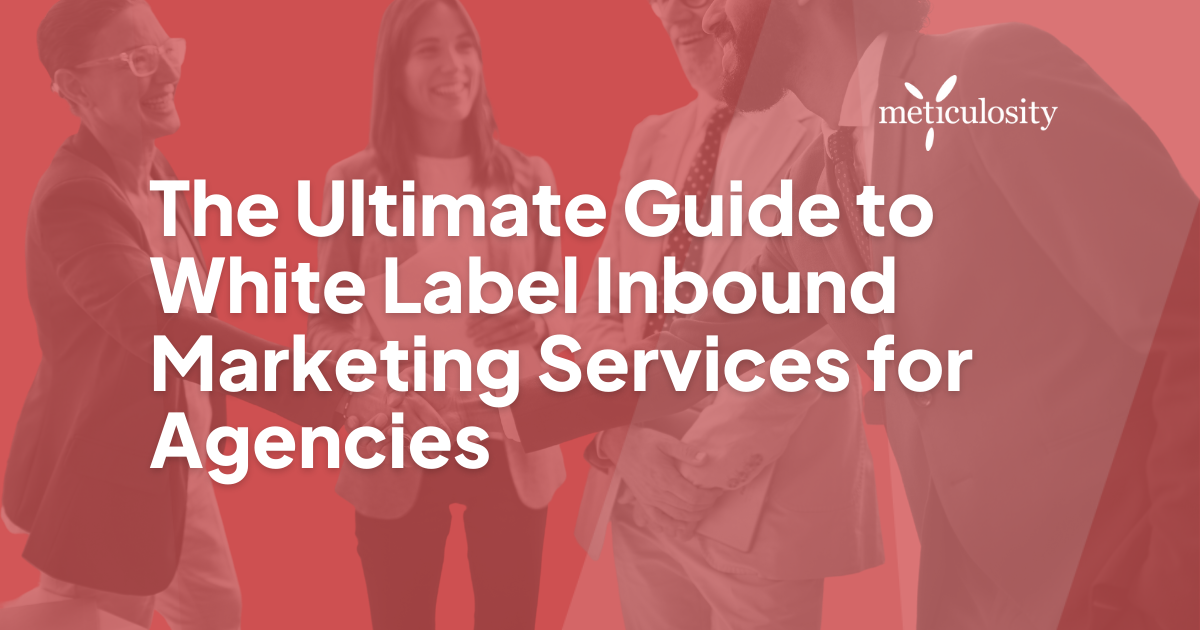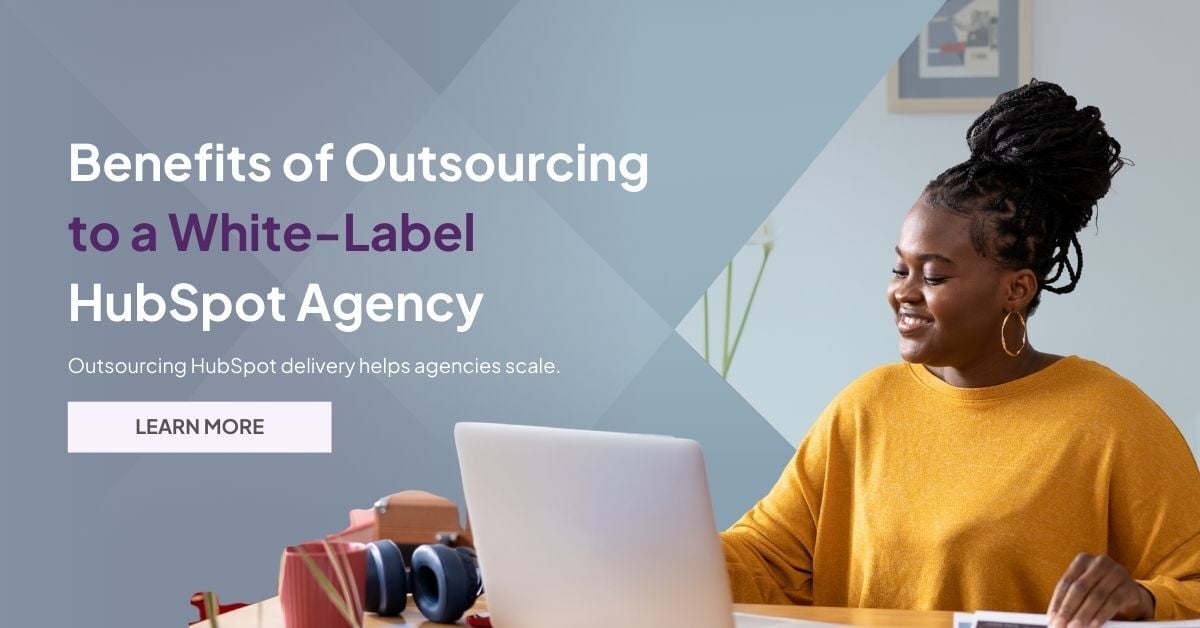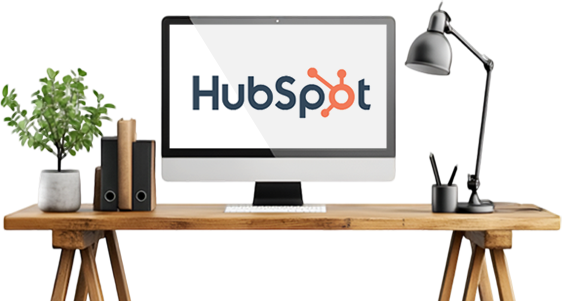Are you an agency feeling the pinch as you try to provide comprehensive inbound marketing services all by yourself?
White-label solutions - a game-changer that's expected to skyrocket to a jaw-dropping $1.8 billion value by 2027 according to recent studies. In this blog, you will learn everything necessary for weaving white-label inbound marketing services into your agency's tapestry of offerings seamlessly.
Key Takeaways
- White-label inbound marketing allows agencies to offer additional services without the need for extra staff or training.
- Common white-label inbound marketing services include web design and development, SEO services, email marketing, social media management, and content creation.
- Benefits of white-label inbound marketing for agencies include increased revenue, expanded service offerings, enhanced brand credibility, and improved client loyalty.
- When choosing a white-label inbound marketing partner, it's important to evaluate their reputation and experience in the industry as well as consider communication and transparency.
Understanding White-Label Inbound Marketing
White-Label Inbound Marketing refers to the practice of outsourcing marketing services to a third-party provider, who then delivers those services under the agency's brand.
Definition and Benefits for Agencies
White-label inbound marketing is a good choice for agencies. It means using another company's services and selling them as your own. With this, you can offer more to your clients without doing extra work.
You save time and cost because you don't need new staff or training. Your brand grows as you provide more value to your clients. Your revenue also goes up because of the added services.
For these reasons, many agencies choose white-label inbound marketing.
Common White Label Inbound Marketing Services
Some of the common white-label inbound marketing services include web design and development, SEO services, email marketing, social media management, and content creation. Discover how these services can benefit your agency and help you grow your client base.
Web Design and Development
Web design and development is a key part of white-label inbound marketing. Clients love websites that look good, work well, and are easy to use. A dull or hard-to-use website will not keep your visitors for long.
You need an expert team to create and manage these sites. White-label teams know how to do this right away. They can build mobile-friendly, SEO-optimized websites that lead people into action with speed.
This service helps agencies add more value without hiring new staff or learning new things.
SEO Services
SEO services are a key part of inbound marketing. They help your website show up in online searches. When people look for what you sell, SEO makes sure they find you. This service uses keywords that match what people search for.
It also improves how your website works so it ranks high on search sites like Google. With SEO, more people can find and use your site with ease.
Email Marketing
Email marketing is an important white-label inbound marketing service that agencies can offer to their clients. With email marketing, businesses can reach their target audience directly through personalized and targeted messages.
It allows for effective communication with customers, promoting products or services, and building brand loyalty. By incorporating email campaigns into their overall marketing strategy, agencies can help their clients generate leads, increase conversions, and drive revenue.
It's crucial to create engaging and impactful content that resonates with the recipients to achieve successful email marketing campaigns. Regular analysis of data and metrics helps in identifying trends and optimizing future campaigns for better results.
Social Media Management
Social media management is a vital component of white-label inbound marketing services for agencies like yours. It involves managing and optimizing social media platforms to help businesses connect with their target audience and promote their brand.
With social media management, you can create engaging content, schedule posts, respond to comments and messages, analyze performance metrics, and run targeted ad campaigns. By effectively managing social media platforms such as Facebook, Twitter, Instagram, LinkedIn, and YouTube, you can boost brand awareness, drive website traffic, generate leads, and ultimately increase conversions for your clients' business.
Content Creation and Marketing
Content creation and marketing is a crucial aspect of white-label inbound marketing services for agencies. It involves the creation and distribution of valuable, relevant, and consistent content to attract and engage target audiences.
This can include blog articles, social media posts, videos, infographics, and more. By providing high-quality content that educates or entertains their target market, agencies can establish themselves as experts in their field while also driving traffic to their clients' websites.
Effective content marketing strategies help to improve search engine rankings, generate leads, build brand awareness, and ultimately increase conversions for both the agency and its clients.
The Benefits of White-Label Inbound Marketing for Agencies
White-label inbound marketing offers numerous benefits for agencies, such as increased revenue, expanded services, enhanced brand credibility, and improved client loyalty. Discover how white-label solutions can transform your agency’s success in the competitive marketing industry.
Increase Revenue
To increase revenue, white-label inbound marketing can be a game-changer for agencies. By offering a range of services like web design, SEO, email marketing, and social media management to clients under their own brand name, agencies can attract new customers and upsell existing ones.
With the expertise and scalability provided by a white-label partner, agencies can expand their service offerings without investing in additional resources or hiring new staff. This not only boosts revenue but also establishes the agency as an authority in the industry while keeping client loyalty intact.
So, if you want to grow your agency's bottom line, consider embracing white-label inbound marketing services.
Expand Services
Expanding your services is a key benefit of white-label inbound marketing for agencies. By partnering with a white-label provider, you can offer a wider range of services to meet the diverse needs of your clients.
This allows you to become a one-stop-shop for all your marketing needs, from website design and development to SEO services, email marketing, social media management, and content creation.
With the ability to expand your offerings, you can attract more clients and increase revenue while providing comprehensive solutions that help them achieve their business goals. Plus, by offering an array of services under your brand name, you build credibility and trust with clients who see you as an expert in various marketing strategies.
Build Brand Credibility
Building brand credibility is essential for any agency offering white-label inbound marketing services. By consistently delivering high-quality services and producing effective results for clients, agencies can establish themselves as experts in their field.
This builds trust and confidence among clients, which can lead to long-term partnerships and referrals. Additionally, agencies can showcase their expertise through case studies, testimonials, and thought leadership content to further enhance their brand credibility.
It's important to focus on providing value and demonstrating a deep understanding of the industry to stand out from competitors and build a strong reputation in the market.
Maintain Client Loyalty
Maintaining client loyalty is crucial for the success of any agency. By consistently delivering high-quality white-label inbound marketing services, agencies can build trust and foster long-term relationships with their clients.
This requires clear and transparent communication, setting realistic expectations, and providing exceptional customer service. It's important to listen to client feedback, address any concerns promptly, and go above and beyond to meet their needs.
By prioritizing client satisfaction and consistently exceeding expectations, agencies can ensure that clients remain loyal and continue to choose their services over the competition.
Choosing a White-Label Inbound Marketing Partner
When choosing a White-Label Inbound Marketing partner, it is crucial to evaluate their reputation and experience in the industry.
Evaluate Partner Reputation and Experience
As a marketer or business professional looking for a white-label inbound marketing partner, it's important to evaluate their reputation and experience. Here are some key factors to consider:
- Look for a partner with a proven track record in delivering successful results. Check their portfolio, case studies, and client testimonials to assess their expertise.
- Consider the partner's industry experience. Have they worked with businesses similar to yours? Do they have knowledge of your target audience and market?
- Research the partner's reputation within the industry. Are they well-known and respected? Do they have positive reviews from other agencies or clients?
- Assess the partner's team members' qualifications. Do they have certifications or training in inbound marketing strategies? Are they up-to-date with the latest trends and best practices?
- Evaluate the partner's communication style and responsiveness. Do they prioritize clear and timely communication? Can you easily reach them when needed?
- Consider the level of customization offered by the partner. Will they tailor their services to meet your specific needs and brand identity? Can they adapt their strategies to align with your goals?
- Look for a partner who provides ongoing support and guidance throughout your partnership. Will they offer regular updates, reports, and feedback on campaign performance?
Consider Communication and Transparency
Communication and transparency are crucial factors to consider when choosing a white-label inbound marketing partner. Here are some important points to keep in mind:
- Clear and open communication channels: Make sure the partner has effective communication channels in place, such as email, phone, or project management software. This allows for easy collaboration and keeps everyone on the same page.
- Transparency in reporting: It's essential that the partner provides regular and transparent reports on the progress and results of your campaigns. This helps you track performance and make necessary adjustments.
- Accessibility and responsiveness: Ensure that the partner is easily accessible and responsive to inquiries or concerns. Prompt communication is important to address any issues promptly.
- Openness about strategies: The partner should be willing to share their strategies, tactics, and methodologies with you. This helps build trust and allows you to understand how they are working toward achieving your goals.
- Honesty about limitations: A reliable partner will be honest about their limitations or areas where they may need additional support. This upfront honesty sets realistic expectations from the beginning.
Assess Customization and Support
When choosing a white-label inbound marketing partner, it's crucial to assess their customization and support. Here are key factors to consider:
- Customization: Look for a partner that offers customizable solutions tailored to your agency's branding and client needs. This includes personalized strategies, branded reports, and the ability to integrate seamlessly with your existing systems.
- Support: Evaluate the level of support provided by the partner. Do they offer dedicated account managers or a helpdesk? Are they available for consultations and training sessions? Ensure they have reliable customer support channels to address any issues or concerns promptly.
- Expertise: Consider the partner's expertise in the specific inbound marketing services you require. Do they have a proven track record and industry knowledge? Look for certifications or partnerships with reputable platforms or tools relevant to your services.
- Scalability: Assess if the partner can accommodate your agency's growth and scaling needs. Can they handle increasing workloads without compromising quality? Ask about their capacity to take on new clients and projects as your business expands.
- Reporting and Analytics: Find out what kind of reporting capabilities the partner offers. Can they provide detailed analytics, data insights, and performance metrics? Accessible reporting tools will enable you to track campaign effectiveness and optimize strategy accordingly.

How to Integrate White Label Inbound Marketing Services
Learn how to seamlessly integrate white-label inbound marketing services into your agency's operations and maximize the benefits for both your clients and your business.
Onboarding Process
When it comes to the onboarding process for white-label inbound marketing services, it's important to have a clear plan in place. First, we need to establish communication channels so that everyone is on the same page.
This can include regular meetings or check-ins with key stakeholders. Next, we should set goals and expectations for the project to ensure that both parties are aligned. This will help us track progress and measure success along the way.
Lastly, we'll walk you through our onboarding steps and make sure you understand each one before moving forward. By following this process, we can ensure a smooth transition into working together and achieving your marketing goals.
Setting Goals and Expectations
To make the most out of white-label inbound marketing services, it's crucial to set clear goals and expectations. By doing this, you can align your agency's objectives with the desired outcomes for your clients.
Start by identifying what you want to achieve through these services, whether it's increasing website traffic or generating more leads. Then, communicate these goals to your white-label partner so they understand what needs to be done.
Together, you can establish realistic timelines and milestones as benchmarks for success. By setting goals and expectations upfront, you'll ensure that everyone is on the same page and working toward a common objective.
Establishing Communication Channels
To effectively integrate white-label inbound marketing services, it is important to establish clear communication channels with your partner. Regular and open lines of communication ensure that both parties are on the same page when it comes to goals, expectations, and ongoing strategies.
This can be done through regular check-in meetings, email updates, and shared project management platforms. By establishing effective communication channels from the start, you can ensure a smooth integration process and a successful partnership with your white-label inbound marketing provider.
Pricing and Profitability in White-Label Inbound Marketing
When it comes to pricing and profitability in white-label inbound marketing, understanding the various pricing structures, balancing client expectations, and considering profit margins is crucial for agencies to ensure success.
Understanding Pricing Structures
The pricing structures for white-label inbound marketing services can vary depending on the agency and the specific services offered. It's important to understand how these structures work in order to make informed decisions for your business.
Pricing may be based on factors such as the scope of work, the level of expertise required, or the complexity of the project. Some agencies may offer flat rates or package deals, while others may charge hourly rates or have tiered pricing options.
It's essential to thoroughly review and compare pricing structures before making a commitment to ensure that you are getting a fair value for your investment.
Considering Profit Margins
When it comes to white-label inbound marketing services for agencies, it's important to consider profit margins. As an agency, you want to make sure that the services you offer are not only valuable to your clients but also profitable for your business.
When setting prices for white-label services, take into account the costs involved in delivering those services and factor in a reasonable profit margin. It's essential to strike a balance between keeping your prices competitive and ensuring that you can generate enough revenue to sustain your agency.
By carefully considering profit margins, you can maximize profitability while still providing top-notch services to your clients.
Balancing Client Expectations
Managing client expectations is a crucial aspect of providing white-label inbound marketing services. As an agency, it's important to strike the right balance between meeting your clients' needs and setting realistic goals.
One way to achieve this is by having clear and transparent communication from the start. By openly discussing what can be achieved within the given timeframe and budget, you can ensure that both parties are on the same page.
Setting achievable expectations helps build trust with clients and allows you to deliver quality services that align with their goals. It's also essential to regularly evaluate progress, provide updates, and make adjustments as needed throughout the partnership.

Managing Clients and Delivering Results
Managing clients and delivering results requires clear and transparent communication, setting realistic expectations, and consistently providing high-quality services.
Importance of Clear and Transparent Communication
Clear and transparent communication is vital when it comes to white-label inbound marketing services for agencies. It helps to establish trust and build strong relationships with clients.
By being open and honest about goals, strategies, and progress, agencies can ensure that everyone is on the same page and working toward the same objectives. This clear communication also allows for better collaboration between the agency and its clients, leading to more effective campaigns and better results.
Overall, clear and transparent communication is a key factor in the success of any white-label inbound marketing partnership.
Setting Realistic Expectations
As an agency that offers white-label inbound marketing services, it's important to set realistic expectations for your clients. This means being upfront and transparent about what you can deliver and how long it will take.
Avoid making promises that you can't keep or setting unrealistic goals. Instead, focus on creating a clear and achievable strategy based on the client's objectives and budget. By setting realistic expectations from the start, you can build trust with your clients and ensure their satisfaction with the results of your white-label inbound marketing services.
Delivering Quality Services
Delivering quality services is crucial for agencies offering white-label inbound marketing. As an agency, my goal is to provide exceptional value to my clients by delivering high-quality services that meet their needs and expectations.
This involves understanding the unique goals and requirements of each client, developing a customized strategy, and implementing it with precision. By staying up-to-date with industry trends and best practices, we can ensure that the services we deliver are effective and yield positive results.
Clear and transparent communication is key to managing client expectations and building trust. Ultimately, delivering quality services not only helps me retain loyal clients but also enhances my brand credibility as an agency providing top-notch inbound marketing solutions.
Staying Updated on Industry Trends and Best Practices
Stay ahead of the competition by continually learning and adapting to the ever-changing landscape of inbound marketing. Discover how staying updated on industry trends and best practices can elevate your agency's success.
Continuous Education and Training
Continuous education and training are essential for staying ahead in the ever-changing world of marketing. As a marketer or business professional, it is crucial to continually update your knowledge and skills to remain competitive. Here are some key strategies for ongoing learning:
- Attend industry conferences and seminars: These events provide an opportunity to learn from experts, gain insights into new trends, and network with like-minded professionals.
- Take online courses and certifications: Online platforms offer a wide range of courses on various marketing topics, allowing you to learn at your own pace and gain recognized certifications.
- Read industry publications and blogs: Stay updated with the latest news and insights by regularly reading marketing publications, blogs, and newsletters.
- Join professional associations: Being part of industry associations allows you to connect with peers, access exclusive resources, and attend educational events tailored to your field.
- Participate in webinars and workshops: Webinars and workshops provide interactive learning experiences where you can ask questions, engage with experts, and gain practical knowledge.
- Experiment with new tools and technologies: Embrace new marketing tools and technologies to stay on top of industry advancements while enhancing your skill set.
- Engage in networking activities: Attend networking events or join online communities where you can connect with other professionals, exchange ideas, and learn from their experiences.
- Analyze data and metrics: Use analytics tools to measure the performance of your marketing campaigns, analyze data trends, identify areas for improvement, and make data-driven decisions.
- Seek mentorship or coaching: Learn from experienced professionals who can provide guidance, share their expertise, and help you navigate challenges in your marketing career.
- Stay curious: Cultivate a mindset of continuous learning by remaining curious about new ideas, perspectives, and emerging trends in the marketing field.
Utilizing Data and Analytics
Data and analytics are essential tools for marketers and business professionals. They provide valuable insights into customer behavior, trends, and campaign performance. Here are some ways to use data and analytics effectively:
- Measure campaign success: Analyze data to determine the effectiveness of your marketing campaigns. Look at metrics like click-through rates, conversion rates, and return on investment (ROI) to understand what is working and what needs improvement.
- Identify target audience: Use data to identify your target audience's demographics, interests, and preferences. This information helps you tailor your marketing messages and target your efforts more effectively.
- Optimize website performance: Analyze website analytics to understand how visitors interact with your site. Look at bounce rates, time spent on pages, and exit pages to identify areas for improvement in user experience.
- Personalize marketing messages: Use data on customer preferences and behaviors to create personalized marketing messages that resonate with your audience. This can lead to higher engagement and conversions.
- Track social media performance: Utilize social media analytics to track engagement, reach, and follower growth across various platforms. This helps you understand which networks are most effective for your brand and adjust your strategy accordingly.
- Improve email marketing: Analyze email campaign metrics such as open rates, click-through rates, and unsubscribe rates to refine your email marketing strategy. Use this data to send targeted emails that align with customer interests.
- Make data-driven decisions: Base your marketing decisions on data rather than assumptions or guesswork. Utilize analytics tools to gather insights that inform strategic choices about messaging, channels, targeting, and budgets.
Networking with Other Agencies
Networking with other agencies is a great way to expand your knowledge and connect with professionals in the industry. Here are some benefits of networking:
- Learn from others: By networking with other agencies, you can gain valuable insights and learn from their experiences. It's an opportunity to exchange ideas, discuss challenges, and discover new strategies.
- Collaborate on projects: Networking allows you to find potential partners for collaboration. By working together, you can combine your strengths and resources to create more impactful campaigns or projects.
- Gain referrals: When you network with other agencies, they may refer clients or projects to you if they see a good fit. This can help you expand your client base and increase revenue.
- Stay updated on industry trends: Through networking events or online communities, you can stay informed about the latest trends and best practices in the marketing industry. This knowledge can give you a competitive edge and help you offer better services to your clients.
- Build relationships: Networking is all about building relationships with like-minded professionals. These connections can lead to long-term partnerships, mentorships, or even friendships that can support your professional growth.
Conclusion
In conclusion, white-label inbound marketing services can be a game-changer for agencies. They offer numerous benefits such as increasing revenue, expanding services, and building brand credibility.
By choosing the right partner, integrating the services effectively, managing clients well, and staying updated on industry trends, agencies can successfully leverage white-label inbound marketing to achieve their goals and stay ahead in today's competitive market.
So, start exploring this valuable strategy and take your agency to new heights!
Click here to learn more about agency marketing.
FAQs
1. What is white-label inbound marketing?
White-label inbound marketing takes care of lead generation and automation for agencies under their own brand.
2. How does white-label inbound marketing help with lead generation?
The service uses various tactics to attract potential clients, hence boosting the rate of lead generation for your agency.
3. Can white label services improve Return on Investment (ROI)?
Yes, by taking over tasks like automation and lead generation, these services can boost your ROI by increasing efficiency in operations.
4. What are the benefits of using a white-label service for agencies?
Benefits include saving time by automating processes, improving the quantity and quality of leads generated, and enhancing overall return on investment without needing extra resources or effort from the agency's side.








